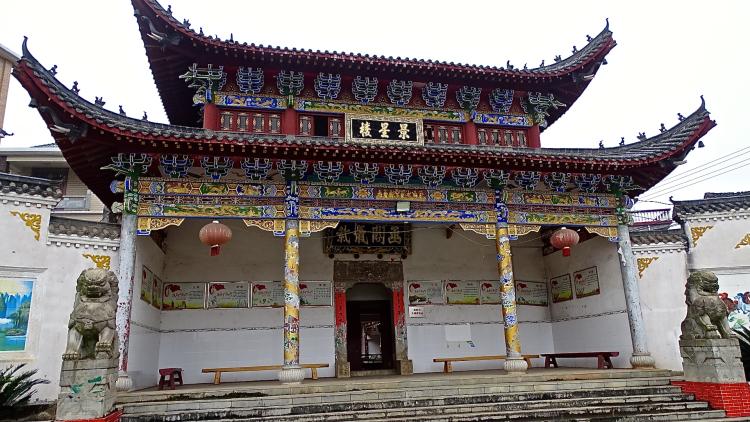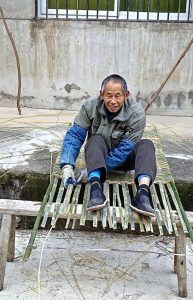By Kalinga Seneviratne
HUANGSHI, Hubei Province, China | 12 January 2024 (IDN) — About 30 minutes drive from this city in Hubei Province are villages that are providing a model of village-based grassroots democracy that is paving the path to achieving the sustainable development goals (SDGs), adopted by the United Nations (UN) in 2015, which China supported.
The SDG agenda of the UN stresses governance and partnerships involving public and private actors as key elements for achieving the goals by 2030. This model of village development, which has been implemented at least since 2017, provides a good example of China’s growing engagement in sustainable development through the concept of collaborative governance.
“Success for this strategy has two main reasons,” explained Prof Ji Li of the Journalism and Communication School of Wuhan University, who took me on a tour of three villages accompanied by two government Town Officials from Huangshi city.
“One is people have built up a trust (living together) over the years. Second is they see benefits if they make profits (from society enterprise). So they follow government strategy (for village development). It took time to build trust between the government and the village people,” added Prof Li, who has been involved in development communication projects in China for a long time.
“Self-autonomy”
 The ancestral worship temple that existed before the PRC was established in 1949 by Mso Zedong. Credit: Kalinga Seneviratne
The ancestral worship temple that existed before the PRC was established in 1949 by Mso Zedong. Credit: Kalinga Seneviratne
The grassroots democracy practiced at the village level is “self-autonomy,” which existed before the People’s Republic of China (PRC) was established in 1949 by Mao Zedong, said a local town official, who did not want to be named as she is not authorized to speak to the media as an official representative. But, she emphasized that at this level of village development, “the government tries very hard not to dictate”.
“The village head is elected by villagers. Outsiders will not take part in it,” explained the town official, adding, “government doesn’t want to select leaders. They want the villagers to elect their leaders, some are women”.
Each village has a colourful ancestral worship temple, a tradition that existed before the communist revolution. It is here that the villagers meet, elect their leaders and discuss village affairs. Each temple has a central enclosed area for these meetings. The town officials also meet the villagers at these venues when they need to discuss development strategies and government funding.
“At these meetings, when the government offers the money, the villagers could refuse if they don’t want to work on a proposed development project,” the town official told IDN. “It is the role of the village head to make the villagers trust the project, for them to join in.”
To qualify as a village leader, the person needs to be voted by most villagers and recognized by town officials as a trusted person for government funds to be invested in the village.
The volunteer army
At Liu Village in Yangxin County, IDN met Liu Dong Dong, a 31-year-old village head. He has worked in the volunteer army and after returning to the village, he has become a farmer and also runs a village shop.
“I lead the village to help people to expand the economy and get them out of poverty (and) to improve our happiness index, as well as make our village clean. I also help villages to negotiate better (with town officials) when they have a problem or a disagreement,” Dong told IDN.
With financial assistance from the government, the village has set up a grape orchard. “Every day about ten people work in the farm. Grapes are used to make wine,” he explained.
Established in 2015, the vineyard covers an area of 100 mu (6.67 hectares). By 2017, the harvesting income was over 300,000 Yuan (USD 43,000) and the sales income of traditional winemaking is now over 700,000 Yuan (USD 98,150).
The Chinese concept of grassroots development democracy is based on a synergy of government funding, grassroots consent and transparent spending to realize the SDGs.
Before receiving the government funding the village has to establish what they call a “Village Collaborative Society”. It functions like a company. The village appoints two people to administer it and villagers are paid by the society to work on the project. The head of the society is a member of the village elected by the villagers.
The villagers use the land in the village for the development project. Profits go to the society and village members share the profits. A village does not have to pay back to the government the money given to start the project. If it makes a profit it is left alone. “But if you are making losses, the government will send Town Officials to find out the problem. If someone has made a serious mistake, this person will have to pay for it”, Dong explains further.
Tea plantations and oil production
 Li Meng Wenweaving a mat outside his home. Credit: Kalinga Seneviratne
Li Meng Wenweaving a mat outside his home. Credit: Kalinga Seneviratne
In the adjoining village, oil tea plantations and oil production are the main sources of income. The high-yielding oil tea plantations were begun in 2010, and now these span an area of 2000 mu (120 hectares). The cooperative has its oil tea processing plant under the trademark “Defu Village”. The processing plant works for about two months a year after harvesting in November.
In addition to the government, 38 families have invested in the company in the form of mortgaging their land to invest in tea plantations. They get 1,500 Yuan (USD 210) per year in return.
At the entrance to the plantation, there is a large notice board detailing the investments in the venture. The yellow box lists the workers and how much they get. The Green box gives a detailed list of how much villagers get (as shareholders), and the Blue box lists the landholders. The system seems very transparent.
“If you rent your land, you get twenty percent more share from the society,” Li Yudou, a local told IDN. “I work here and get money from the society. This is a way to live out of poverty. Society would prefer the poor people to work and get money”.
But, Li Meng Wen, a 72-year-old villager weaving a mat outside his home, told IDN that his kids support him. However, he grows sweet potatoes, some vegetables for his consumption. “Mat weaving is a hobby,” he said.
In 2019, the local village coop earned more than 800,000 Yuan (USD 112,254). During the fruit picking period in November every year, nearly 100 villagers from adjoining areas work in the oil tea and grape plantations.
A tourism venture
Another village IDN visited is Li Village, where the local community has set up a tourism venture in a scenic area of mountains, paddy fields, and waterways. During the summer, the tourists come to trekking, hire bicycles for riding, and also taste special local cuisine at a newly built restaurant that resembles the old village house architecture.
Chen Yang Fan, Tourism Development Officer of the Town Office who accompanied IDN to the village, said that his role is to help villages develop their economies. “We develop strategies for the development of the town. From time to time, we visit village heads to get advice on the development strategies for their village,” he explained. “We ask for feedback from heads. When agreed, I oversee the disbursement of funds to the village.”
Though the town officials described the villages as “poor”, most people live in concrete houses, some two or three stories. IDN was told that most 30-50-year-olds go to the cities to work but invest money to develop their family homes. Also, 30 percent of the profits from the village collaborative ventures need to go to the poor families in the village. The villages have schools and health clinics that the government funds.
During the village visit, Prof Li pointed to IDN, a saying engraved on the wall of an ancestral temple. It says, as a principle, not to go to courts. Try to find a solution by yourselves by discussing with the head of the village and among themselves. Do not get others involved to solve your problems.
“Democracy here is, don’t go to other people to solve your problems. Discuss and solve yourselves,” she explained. [IDN-InDepthNews]
Photo: The grassroots democracy practised at the village level is “self-autonomy” that existed before the People’s Republic of China (PRC) was established in 1949 by Mao Zedong. Credit: Kalinga Seneviratne.
This article was produced as a part of the joint media project between The Non-profit International Press Syndicate Group and Soka Gakkai International in Consultative Status with ECOSOC on 12 January 2024.
IDN is the flagship agency of the Non-profit International Press Syndicate.


